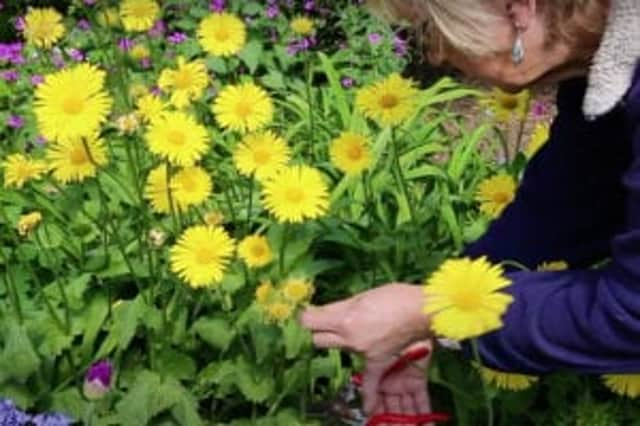"The world is all right in the garden"


Gardens and outdoor space became havens for so many during lockdown. Fiona Evans looks at the pivotal role they have played in our health and well-being.
If you are fortunate enough to be reading this in sight of a garden, take a moment to look outside and admire the view.
Advertisement
Hide AdAdvertisement
Hide AdStep out, breathe in the fresh air and let your eyes linger on Mother Nature’s handiwork while you listen to her tune. You won’t be disappointed.
Whether your personal version of Eden consists of beautifully groomed acres or a few potted plants on a balcony matters not.
What counts, crucially, are the benefits that space brings and never has this been more apparent than during lockdown.
According to a new report from the National Garden Scheme, 92 per cent of respondents to an online survey said their gardens and outdoor spaces were ‘extremely important’ to them during lockdown in terms of health and well-being.
Advertisement
Hide AdAdvertisement
Hide AdAnyone involved with the organisation, which has been raising millions of pounds for nursing and health charities by opening private gardens across England and Wales since 1927, knows the therapeutic value of gardening.
But for the uninitiated, lockdown was a bit of a revelation.
The National Garden Scheme’s report emphasises the vital role that gardens and outdoor spaces played, and continue to play, in people’s physical and mental health and well-being during this unprecedented time.
Bringing together feedback from garden owners, viewers of the charity’s unique Virtual Garden Visits that aired throughout lockdown, and an online survey conducted in August, the report confirms that the power of gardens to do good has never been more important.
Advertisement
Hide AdAdvertisement
Hide Ad“Anecdotally, from the responses we received to our Virtual Garden Visits during lockdown, we knew that gardens (real and virtual) were playing a significant and important role in people’s lives,” said George Plumptre, chief executive of the National Garden Scheme.
In August the charity ran an online survey titled ‘The importance of our gardens and outdoor spaces during lockdown’.
“Over 2,400 people responded giving us a set of key statistics which confirmed much of the feedback we had already established; that access to gardens and green spaces can play a vital role in our ability to cope in times of crisis,” said George.
Of the 2,419 people who responded to the online survey, 87 per cent said that a key benefit gained from access to their garden/outdoor space during lockdown was that ‘it helped to relieve stress’.
Advertisement
Hide AdAdvertisement
Hide AdAll of those with balconies or window boxes (35 respondents) said a key benefit was the reduction in stress – all of these were within an urban or suburban environment.
And of the 20 respondents with access only to a public outdoor space, 95 per cent said that a key benefit was that ‘it helped to relieve stress’.
More than two thirds said that a key benefit gained from access to their garden/outdoor space during lockdown was that ‘it kept them fit and contributed positively to their physical fitness’.
The figures speak volumes but louder still are the various, often moving testimonies of some of those quoted in the report.
Advertisement
Hide AdAdvertisement
Hide AdOne person wrote: “I live alone and suffer depression and loneliness at the best of times so lockdown was testing but the bees, butterflies and hoverflies coming to my planting kept me company and provided company, interest and stimulation as well as relaxation. I was profoundly and consciously grateful for my small outside space during lockdown.”
Another observed: “Covid-19 does not come into the equation when out in our garden.”
The report noted that asked what their garden meant to them during lockdown, the most common, recurring themes from respondents were how important they were for maintaining a sense of sanity and normality - with many describing their gardens as a sanctuary, a friend or simply ‘everything’.
The bond with nature and neighbours was also highlighted.
Seventy seven per cent used their gardens for relaxation, 81 per cent spent their time growing and propagating seeds, and 70 per cent grew their own produce.
Advertisement
Hide AdAdvertisement
Hide AdScotland’s Gardens Scheme national organiser, Liz Stewart, said the report corresponds with anecdotal evidence they have received from gardeners in Scotland, of the importance of gardens and green spaces to mental and physical well-being.
“Garden visits have been important too and since we were able to open our gardens to visitors again in the middle of July, we’ve received feedback from visitors about how much they’ve appreciated being able to visit gardens,” said Liz.
“Anecdotally, some of our gardens have also reported welcoming people who have never visited gardens before and it’s wonderful to see this new appreciation of gardens as safe and welcoming spaces.”
As we navigate these uncertain times, outdoor space will continue to provide the bedrock of good health for many people.
And our relationship with such sanctuary will surely only grow; in the words of National Garden Scheme garden owner, Brenda Salmon: “The world is all right in the garden.”